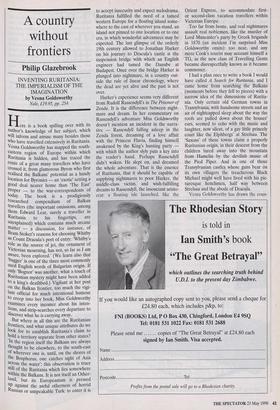A country without frontiers
Philip Glazebrook
INVENTING RURITANIA: THE IMPERIALISM OF THE IMAGINATION by Vesna Goldsworthy Yale, £19.95, pp. 254 Here is a book spilling over with its author's knowledge of her subject, which will inform and amuse many besides those who have travelled extensively in Ruritania. Vesna Goldsworthy has mapped the south- eastern region of Europe within which Ruritania is hidden, and has traced the route of a great many travellers who have crossed it, from glamorous Byron who first realised the Balkans' potential as a handy location for Byronics — an 'exotic' setting a good deal nearer home than 'The East' proper — to the war-correspondents of today. The book is a prodigiously researched compendium of Balkan travellers (the important omissions, among them Edward Lear, surely a traveller in Ruritania to his fingertips, are unexplained) which contains much arcane matter — a discussion, for instance, of Bram Stoker's reasons for choosing Whitby as Count Dracula's port of entry: 'Whitby's role as the source of jet, the ornament of Victorian mourning, has not, so far as I am aware, been explored.' (We learn also that bugger' is one of the three most commonly used English words of Bulgarian origin. If Only 'Bognor' was another, what a touch of Ruritanian mystery might have been added to a king's deathbed.) Vigilant at her post on the Balkan frontier, too much the vigi- lant official for much intentional humour to creep into her book, Miss Goldsworthy examines every incomer about his inten- tions, and strip-searches every departure to discover what he is carrying away. But where in all this are the Ruritanian frontiers, and what unique attributes do we look for to establish Ruritania' claim to hold a territory separate from other states? In the region itself the Balkans are always thought to be elsewhere, to the south-east of wherever one is, until, on the shores of the Bosphorus, one catches sight of Asia across the water': this observation is truer still of the Ruritania which lies somewhere within the Balkans. It is not itself an Other- land, but its Europeanism is pressed 11P against the awful otherness of horrid Russian or unspeakable Turk: to enter it is to accept insecurity and expect melodrama. Ruritania fulfilled the need of a tamed western Europe for a floating island some- where to the east of wherever you stand, an island not pinned to one location or to one era, in which wonderful adventures may be expected. The last glimpse of the orderly 19th century allowed to Jonathan Harker on his journey to Dracula's castle is the suspension bridge with which an English engineer had tamed the Danube at Budapest. Once over the bridge Harker is plunged into nightmare, in a country out- side the rule of linear chronology, where the dead are yet alive and the past is not over.
Harker's experience seems very different from Rudolf Rassendyll's in The Prisoner of Zenda. It is the difference between night- mare and dream. In her commentary on Rassendyll's adventure Miss Goldsworthy doesn't mention an incident in the narra- rive — Rassendyll falling asleep in the Zenda forest, dreaming of a love affair with the Princess Flavia, finding himself awakened by the King's hunting party with which the author slyly puts a key into the reader's hand. Perhaps Rassendyll didn't waken. He slept on, and dreamed the whole adventure. That is the essence of Ruritania, that it should be capable of supplying nightmares to poor Harker, the middle-class victim, and wish-fulfilling dreams to Rassendyll, the insouciant aristo- crat: a floating isle launched, like the Orient Express, to accommodate first- or second-class vacation travellers within Victorian Europe.
Too far from home, and real nightmares assault real noblemen, like the murder of Lord Muncaster's party by Greek brigands in 1870 (an incident I'm surprised Miss Goldsworthy omits): too near, and any mere Cook's tourist may account himself a TG, as the new class of Travelling Gents became disrespectfully known as it became commoner.
I had a plan once to write a book I would have called A Search for Ruritania, and I came home from searching the Balkans (moments before they fell to pieces) with a narrow idea of the dimensions of Rurita- nia. Only certain old German towns in Transylvania, with handsome streets and an air of nightcapped sleep about the way the roofs are pulled down about the houses' ears, seemed to echo with the music and laughter, now silent, of a gay little princely court like the Elphbergs' at Strelsau. The `Saxons' of these towns claim a properly Ruritanian origin, in their descent from the children lured away into the mountain from Hamelin by the devilish music of the Pied Piper. And in one of those Transylvanian castles whose guns bear on its own villagers the treacherous Black Michael might well have lived with his pic- turesque henchmen, half way between Strelsau and the abode of Dracula.
Vesna Goldsworthy has drawn the min try's boundaries far wider, making them coterminous with the Balkans. Her book is really an enquiry into the ideas and images suggested by 'the Balkans', as their topography and atmosphere exist in the British mind. If auritania' is to have an existence separate from 'the Balkans', I can't agree with her that, for instance, Waugh's Unconditional Surrender happens in Ruritania. Possibly the death of Ritchie- Hook took place just inside the Ruritanian border, but why remove the rest of the story from Yugoslavia? She talks of the imperialism of northern Europe towards the south-east, but she has made Ruritania the imperialist state which swallowed its neighbours. To my mind its forests and castles and walled towns made up a small kingdom ever hard to find, born with the Orient Express, and expunged from the map by the shot fired in neighbouring Sarajevo which started the Great War, and made Rassendyll's dream impossible and Harker's nightmare redundant.



































































 Previous page
Previous page